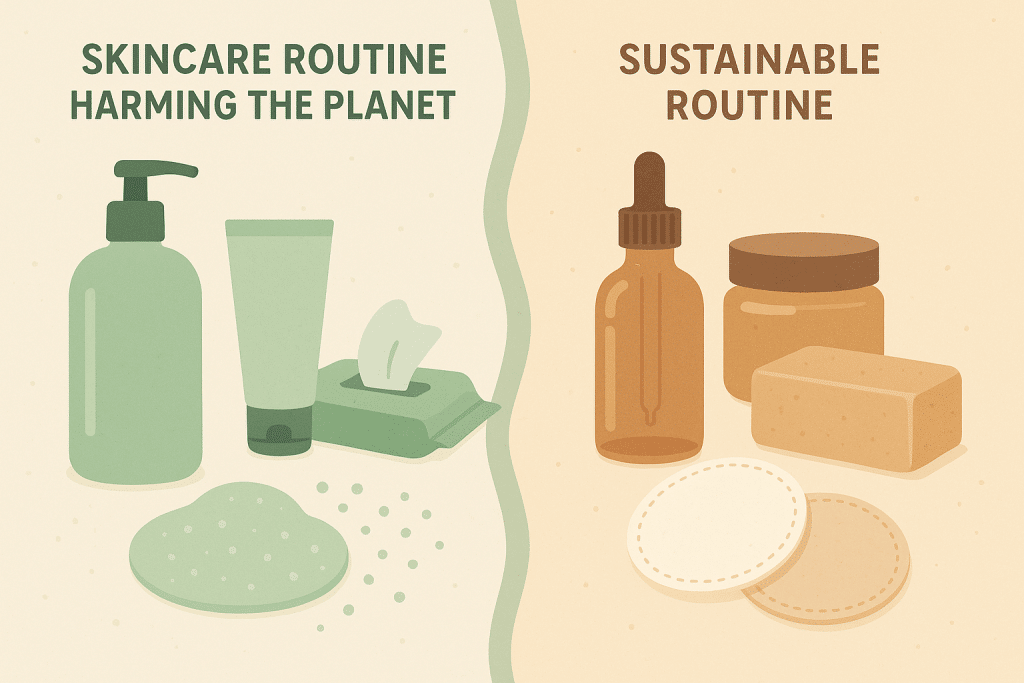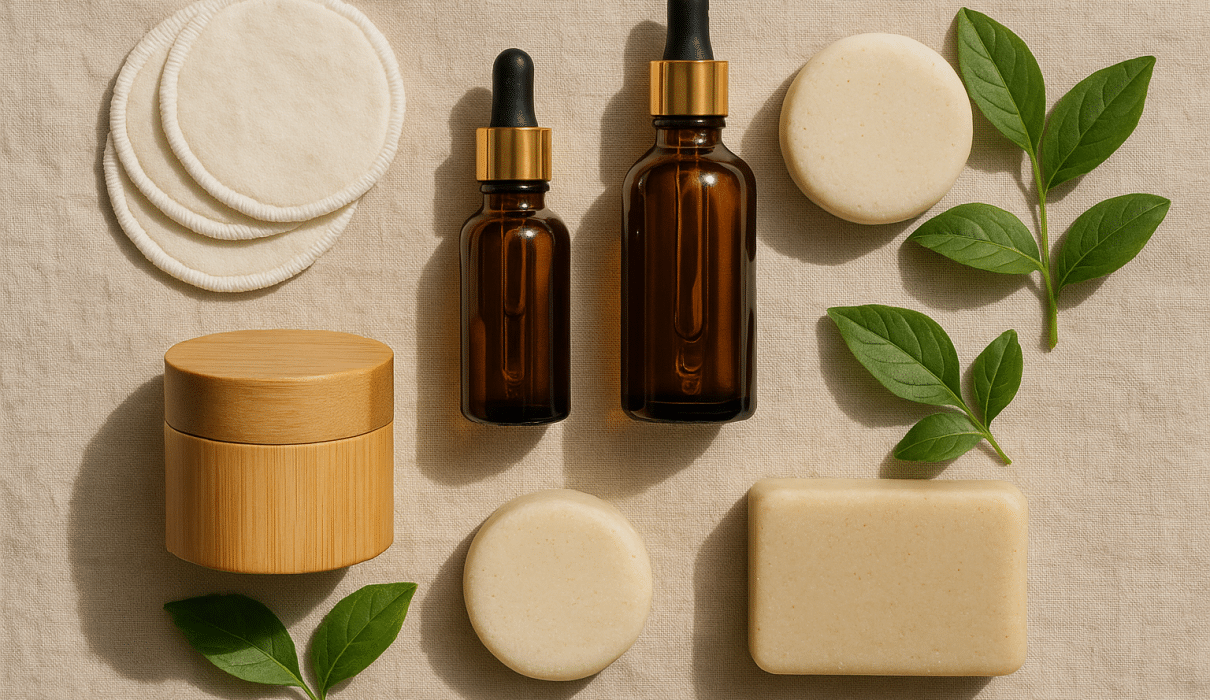🌍 Is Your Skincare Routine Harming the Planet?
The beauty industry is undergoing a green awakening—and for good reason. Many everyday skincare habits are quietly contributing to pollution, plastic waste, and unsustainable practices. If you’ve ever wondered, “Is my skincare routine harming the planet?”—you’re not alone.
This guide explores 7 powerful, planet-friendly swaps that can transform your beauty ritual into a sustainable act of self-care.
💧 1. Swap: Disposable Makeup Wipes → Reusable Cotton Pads

Why it matters: Most makeup wipes are made of non-biodegradable fibers like polyester and are soaked in chemicals that can harm aquatic life. These wipes don’t break down and often end up in landfills—or worse, the ocean.
Planet-friendly solution: Invest in reusable organic cotton pads or bamboo rounds. They’re soft, washable, and can last for years.
Pro Tip: Use them with a homemade micellar water (see our DIY Skincare Recipes) for a full eco-conscious routine.
🧴 2. Swap: Plastic Bottles → Refillable or Glass Packaging
Why it matters: Traditional plastic packaging accounts for 120 billion units of waste annually in the beauty industry alone. Most of it isn’t recyclable.
Planet-friendly solution: Support brands that offer refillable packaging, glass containers, or participate in closed-loop recycling programs. You can check our guide to Refillable Beauty Products for recommendations.
Look for: Brands certified with Cradle to Cradle, Leaping Bunny, or Zero Waste credentials.
🌿 3. Swap: Synthetic Ingredients → Natural & Biodegradable Formulas
Why it matters: Ingredients like microbeads, silicones, and sulfates not only affect your skin but often pollute waterways and harm marine life.
Planet-friendly solution: Read labels. Choose formulas with ingredients you can pronounce—like aloe vera, shea butter, green tea, and jojoba oil.
DIY Bonus: Make your own using recipes from our Sustainable Beauty Hacks.
♻️ 4. Swap: Traditional Sunscreens → Reef-Safe SPF
Why it matters: Chemical sunscreens containing oxybenzone and octinoxate are banned in places like Hawaii due to their role in coral bleaching.
Planet-friendly solution: Opt for mineral sunscreens with zinc oxide or titanium dioxide. These are safer for oceans and your skin.
🚿 5. Swap: Long Showers with Hot Water → Short, Lukewarm Routines
Why it matters: Water overuse is an overlooked part of a skincare routine harming the planet. The longer your routine, the more water and energy you waste.
Planet-friendly solution: Cut your shower to 5–7 minutes and cleanse using lukewarm water. It’s gentler on your skin too!
🧼 6. Swap: Liquid Cleansers → Bar Soaps or Powder Cleansers
Why it matters: Liquid products require more water and packaging—plus preservatives. Many also come in plastic.
Planet-friendly solution: Solid bar cleansers and powdered options reduce your carbon footprint significantly.
Try This: Look for plastic-free beauty items in our Zero-Waste Beauty section.
🎁 7. Swap: Impulse Buys → Thoughtful, Sustainable Purchases
Why it matters: Overconsumption leads to wasted products, expired formulas, and unnecessary waste.
Planet-friendly solution: Before buying, ask:
- Will I use this regularly?
- Is it refillable or recyclable?
- Was it ethically produced?
Use our Top Eco-Friendly Brands list to discover trusted names that align with your values.
🧠 Final Thoughts: Small Changes, Big Impact
If your skincare routine is harming the planet, you’re not alone. But with a few conscious swaps, you can make a massive difference. The journey to eco-beauty isn’t about perfection—it’s about progress.
🔗 External Resources (with DoFollow Links)
❓ FAQ: Skincare & the Planet
Q1: Are eco-friendly skincare products effective?
Yes! Many natural and sustainable ingredients offer better long-term benefits for skin health compared to synthetic alternatives.
Q2: Is glass packaging always better than plastic?
Not always, but it is more recyclable and reduces microplastic pollution.
Q3: What certifications should I look for?
Look for EcoCert, USDA Organic, Leaping Bunny, and Certified B Corp.
Q4: Can I still use my favorite brands?
Start by checking their sustainability policies. Many major brands are evolving toward greener practices.
Ready to switch to a skincare routine that’s kind to your skin and the planet?
Let’s make beauty better—together. 💚

